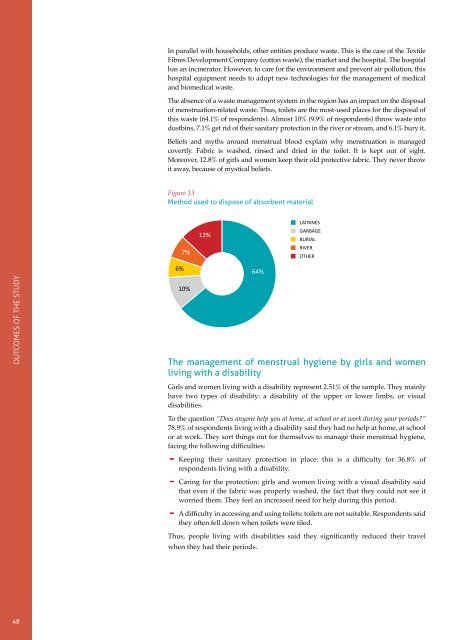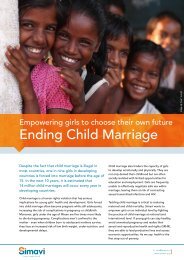In parallel with households, other entities produce waste. This is the case of the TextileFibres Development Company (cotton waste), the market and the hospital. The hospitalhas an incinerator. However, to care for the environment and prevent air pollution, thishospital equipment needs to adopt new technologies for the management of medicaland biomedical waste.The absence of a waste management system in the region has an impact on the disposalof menstruation-related waste. Thus, toilets are the most-used places for the disposal ofthis waste (64.1% of respondents). Almost 10% (9.9% of respondents) throw waste intodustbins, 7.1% get rid of their sanitary protection in the river or stream, and 6.1% bury it.Beliefs and myths around menstrual blood explain why menstruation is managedcovertly. Fabric is washed, rinsed and dried in the toilet. It is kept out of sight.Moreover, 12.8% of girls and women keep their old protective fabric. They never throwit away, because of mystical beliefs.Figure 13Method used to dispose of absorbent material7%13%Outcomes of the study6%10%64%The management of menstrual hygiene by girls and womenliving with a disabilityGirls and women living with a disability represent 2.51% of the sample. They mainlyhave two types of disability: a disability of the upper or lower limbs, or visualdisabilities.To the question “Does anyone help you at home, at school or at work during your periods?”78.9% of respondents living with a disability said they had no help at home, at schoolor at work. They sort things out for themselves to manage their menstrual hygiene,facing the following difficulties:––Keeping their sanitary protection in place: this is a difficulty for 36.8% ofrespondents living with a disability.––Caring for the protection: girls and women living with a visual disability saidthat even if the fabric was properly washed, the fact that they could not see itworried them. They feel an increased need for help during this period.––A difficulty in accessing and using toilets: toilets are not suitable. Respondents saidthey often fell down when toilets were tiled.Thus, people living with disabilities said they significantly reduced their travelwhen they had their periods.48
Management of menstrual hygiene by girls and women whohave undergone genital mutilationAs the study reveals, more than 90% of respondents in this study had undergonefemale genital mutilation. And, 29.1% of girls and women who had been cut thoughtthat their menstrual difficulties were inherent to their excision. Among the difficultiesthey encountered, they mentioned itching, redness, irregular periods, blood flowingout with difficulty, in small amounts.Box 3: Testimonials on the management of menstruation in women who have undergonefemale genital mutilationExcerpt from a statement given in an interview with an excised womanfrom Kedougou:“When I get my period, it lasts for three days and then goes away, coming backseven days later. When I asked the doctor about it, he said it was because ofthe excision.”Statement by a gynaecologist from Kedougou:“Some practices of female circumcision, such as infibulation*, can havenegative consequences on reproductive health, such as a loss of libido, difficultdeliveries, and infections during menstruation.”* An extreme form of excision, consisting of “closing the genital area”.Of the girls and women who had undergone genital mutilation, 24.3% had an infection.Most, 66.7%, use plants or preparations of traditional medicine to treat their infections.Further studies would clarify if certain types of genital mutilation lead to morecomplications than others for MHM. This study has not addressed this issue.It simply notes that women and girls from the region, who are mostly excised, seemto be more prone to infections. These women and girls mostly use cloths and sanitarypads, but not tampons.Outcomes of the studyThe management of menstrual hygiene by women in prisonAt the time this study was conducted, Kedougou prison (MAC, from theFrench Maison d’arrêt et de correction, House of detention and correction) had twofemale inmates.This penitentiary institution is a mixed-gender establishment. The men’s wing isseparate from the women’s. All the prison warders and the head nurse are men.The head nurse is responsible for the primary healthcare of every inmate.Of the two women interviewed, one had never had a period in prison as she hadalready passed the menopause. Women in prison must rely on the help of relativesor people visiting for menstrual hygiene management, because the prison does notprovide sanitary pads or any other protective equipment.According to inmates, the prison has a properly working running water supply, soap,and separate toilets. During our visit, however, there was no running water and nosoap. Furthermore, the toilets did not have doors. Menstruation, therefore, could notbe managed in private. As in any prison, everything is done in the presence of thewarders who, in this case, are all men.49



